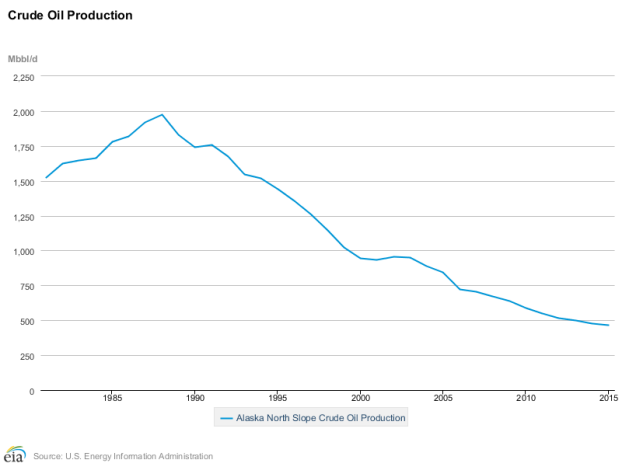As the puzzle-pieces of the Cabinet assemble, it is clear that domestic energy development will play a key role in the Trump Administration’s strategy to reinvigorate the American economy.
Following is an excerpt from a blog post I wrote after Obama’s 2012 State of the Union address (emphasis in original):
I keep circling back to the central irony of the Obama Presidency: Obama could have been the Energy President. Clean, responsible North American energy security is within our grasp, and nothing would jump-start our economy faster than to make that commitment. Think Kennedy/Space Program or Nixon/China: every president since Nixon has promised progress on energy, and now, the president in 2012 is in a position to deliver.
But will he?
It would mean making workable compromises with industry. It might mean giving in on ANWR. It might mean telling the anti-development Luddite environmentalists who have loyally backed him to go pound sand. It might mean acknowledging that we’ve been sold an elitist bill of goods in Global Warming. It might mean backtracking on alternative energy giveaways.
Ain’t gonna happen.
Fast-forward to 2016: It didn’t happen. As much as Obama would like to claim credit for energy abundance and cheaper gasoline, the collapse in oil prices has more to do with (excessive) private investment in the shale boom and the Saudi commitment to nip it in the bud.
Judging from Cabinet-level appointments and names being mulled, Donald Trump intends to claim the title of Energy President. Consider:
- Rex Tillerson at State.
- Rick Perry at Energy.
- Ryan Zinke at Interior.
- Scott Pruitt at EPA.
- Gen. James Mattis at Defense.
Of these, Interior is key. They set leasing policy on Federal and tribal lands, collect royalties, and regulate safety and permitting for offshore oil. Zinke, from Montana, has supported the Keystone XL pipeline and western coal. Montana is also an oil-producing state. Industry knows how to develop American mineral resources without sacrificing the environment. Offshore regulation needs to become less oppressive and more pragmatic. Given Zinke’s bio (geologist, MBA, Navy SEAL commander), it’s safe to assume he has the requisite leadership skills.
Why is Defense important? The Army Corps of Engineers regulates the nation’s wetlands and waterways. Permit approvals are notoriously slow. A take-charge SecDef could patiently explain to the Corps the urgency of this task; I’m fairly sure they’ll see things Mad Dog’s way. There’s also the stalled Dakota Access Pipeline, which would bring 500,000 barrels of Bakken crude to refineries in the Midwest, replacing more expensive (and dangerous) rail transport.
The Keystone XL pipeline was hung up at State before Obama unilaterally nixed it. Trump really doesn’t need Tillerson on board (as if that were a hurdle); State’s authority derives from an Executive Order, which President Trump may choose to reverse using his phone and pen.
Energy has already had a shot fired across their bow. Good luck on the follow-through, Mr. Perry. [Willis Eschenbach speculates how the new regime might dismantle DoE. Excellent read.] And Mr. Pruitt – a litigant against EPA as AG of Oklahoma – is set to spoil EPA’s picnic with the green groups.
Beyond that, what could President Trump do?
Open ANWR, for starters. Alaskan North Slope production has declined steadily to about 450,ooo barrels a day (down from almost 2 million bpd at its peak). Without more North Slope drilling, the Trans-Alaska Pipeline System throughput will decline to its critical minimum — about 200,000 barrels a day — in just a few years. (Graph below.)

As much as government can do to provide a less-hostile environment for energy development, investment (read: oil and gas drilling) will not happen unless and until operators perceive firm prices, now and in the future. Prices have run up lately, partly due to OPEC restraint. If we spur domestic drilling and infrastructure projects, that will be bearish for prices. Oil being a global market, there is little government can do to affect its price. But …
Trump (or at least Trump’s rhetoric) is unafraid of import tariffs. A tariff would give domestic producers a price advantage over imports. As a conservative, I don’t like the idea, but with this guy, nothing would surprise me.
As a candidate, Trump showed that he understood the quick positive impact domestic energy development has on a region (Ohio, as one example). He obviously sees domestic energy as a tool for kicking a lethargic domestic economy in the backside.
All of a sudden, the greenies, watermelons, and whack jobs who oppose every pipeline and frack job will find themselves playing defense in a multi-front war, straining their capacity to resist. Stay tuned.
[Originally published 12/13/16. Remarks revised & extended 12/17/16. Crossposted.]












Join the conversation as a VIP Member